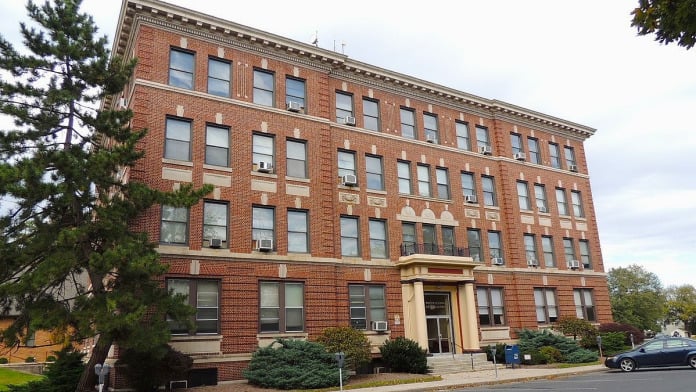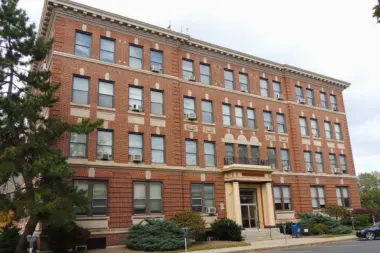About Roxbury Treatment Center
Roxbury Treatment Center – Chambersburg, Pennsylvania is a place where you can find dedicated outpatient care for substance use and mental health needs. Their experienced team provides support through both regular and intensive outpatient programs, offering services like individual, group, and family counseling. We also like that they also offer medication assisted treatment (MAT) options and help you with aftercare planning.
Roxbury accepts Medicaid, private insurance, government funded programs and self pay. Comprehensive assessments and continuing care services are part of the support you receive. Call ahead to learn more about what payment options may apply to your situation.
Accessible Services for the Hearing Impaired Near Capitol Theatre Center
The program’s inclusive approach makes it a special place with services available for hearing impaired individuals and those managing both substance use and mental health concerns. What strikes us most about them is the attention to accessibility and the range of counseling formats. The program also provides personalized support to ensure every individual’s needs are met effectively.
MAT and Recovery Support Near Caledonia State Park
If you’re interested in MAT services then they provide Suboxone, Sublocade, oral Naltrexone, and Vivitrol as part of a comprehensive outpatient plan. You’ll also have access to substance use education and personalized aftercare planning. Their team will work closely with you to create a recovery plan that supports your healing.
Support for Teens and Young Adults Near Memorial Park
If you’re a teen or young adult working through substance use challenges then this program offers tailored care that includes peer support and relapse prevention. Rational Emotive Behavioral Therapy helps you challenge unhelpful thoughts and build healthier habits.
After your appointment, Memorial Park provides open space to unwind while the nearby Capitol Theatre Center offers creative performances to decompress. For outdoor reflection or recharging, Caledonia State Park is just a short drive away.
Facility Overview
Latest Reviews
Rehab Score
Gallery


Other Forms of Payment
Medicaid is a state based program that helps lower-income individuals and families pay for healthcare. Medicaid covers addiction treatment so those enrolled can use their coverage to pay for rehab. When a program accepts Medicaid the client often pays very little or nothing out of their own pocket.
Private insurance refers to any kind of healthcare coverage that isn't from the state or federal government. This includes individual and family plans offered by an employer or purchased from the Insurance Marketplace. Every plan will have different requirements and out of pocket costs so be sure to get the full details before you start treatment.
Self-pay involves paying for treatment out of your own pocket. You can use savings or credit, get a personal loan, or receive help from family and friends to fund your treatment. If you don't have insurance or your insurance plan doesn't cover a specific program, self-pay can help ensure you still get the care you need.
Addiction Treatments
Levels of Care
Outpatient programs are for those seeking mental rehab or drug rehab, but who also stay at home every night. The main difference between outpatient treatment (OP) and intensive outpatient treatment (IOP) lies in the amount of hours the patient spends at the facility.
Intensive Outpatient programs are for those who want or need a very structured treatment program but who also wish to live at home and continue with certain responsibilities (such as work or school). IOP substance abuse treatment programs vary in duration and intensity, and certain outpatient rehab centers will offer individualized treatment programs. Roxbury Treatment Center - Penncraft Avenue's IOP is an organized and structured group treatment setting designed to help maintain sobriety and stability in early recovery.
Treatments
The goal of treatment for alcoholism is abstinence. Those with poor social support, poor motivation, or psychiatric disorders tend to relapse within a few years of treatment. For these people, success is measured by longer periods of abstinence, reduced use of alcohol, better health, and improved social functioning. Recovery and Maintenance are usually based on 12 step programs and AA meetings.
Drug rehab in Pennsylvania is devoted to the treatment of addiction. Levels of care, treatment methods, and settings differ, but the aim of each program is to end drug dependency and empower participants to achieve long-term recovery.
Many of those suffering from addiction also suffer from mental or emotional illnesses like schizophrenia, bipolar disorder, depression, or anxiety disorders. Rehab and other substance abuse facilities treating those with a dual diagnosis or co-occurring disorder administer psychiatric treatment to address the person's mental health issue in addition to drug and alcohol rehabilitation.
Opioid rehabs specialize in supporting those recovering from opioid addiction. They treat those suffering from addiction to illegal opioids like heroin, as well as prescription drugs like oxycodone. These centers typically combine both physical as well as mental and emotional support to help stop addiction. Physical support often includes medical detox and subsequent medical support (including medication), and mental support includes in-depth therapy to address the underlying causes of addiction.
Substance rehabs focus on helping individuals recover from substance abuse, including alcohol and drug addiction (both illegal and prescription drugs). They often include the opportunity to engage in both individual as well as group therapy.
Programs
Adult rehab programs include therapies tailored to each client's specific needs, goals, and recovery progress. They are tailored to the specific challenges adult clients may face, including family and work pressures and commitments. From inpatient and residential treatment to various levels of outpatient services, there are many options available. Some facilities also help adults work through co-occurring conditions, like anxiety, that can accompany addiction.
Young adulthood can be an exciting, yet difficult, time of transition. Individuals in their late teens to mid-20s face unique stressors related to school, jobs, families, and social circles, which can lead to a rise in substance use. Rehab centers with dedicated young adult programs will include activities and amenities that cater to this age group, with an emphasis on specialized counseling, peer socialization, and ongoing aftercare.
Clinical Services
Research clearly demonstrates that recovery is far more successful and sustainable when loved ones like family members participate in rehab and substance abuse treatment. Genetic factors may be at play when it comes to drug and alcohol addiction, as well as mental health issues. Family dynamics often play a critical role in addiction triggers, and if properly educated, family members can be a strong source of support when it comes to rehabilitation.
Group therapy is any therapeutic work that happens in a group (not one-on-one). There are a number of different group therapy modalities, including support groups, experiential therapy, psycho-education, and more. Group therapy involves treatment as well as processing interaction between group members.
In individual therapy, a patient meets one-on-one with a trained psychologist or counselor. Therapy is a pivotal part of effective substance abuse treatment, as it often covers root causes of addiction, including challenges faced by the patient in their social, family, and work/school life.
Amenities
-
Private Setting
Staff & Accreditations
Staff
Shauna Mogerman, MSW, LSW
CEO
Dr. Fauzia Sheikh, MD, DFAPA
Chief Medical Officer
Daniel Quance, CPA
CFO
Loudena Florestal, M.Ed
Director Outpatient Services
Lehoma Theimer
Director of Performance Improvement
Accreditations

The Joint Commission, formerly known as JCAHO, is a nonprofit organization that accredits rehab organizations and programs. Founded in 1951, the Joint Commision's mission is to improve the quality of patient care and demonstrating the quality of patient care.
Joint Commission Accreditation: Yes
Contact Information
25 Penncraft Avenue
Suite 312
Chambersburg, PA 17201